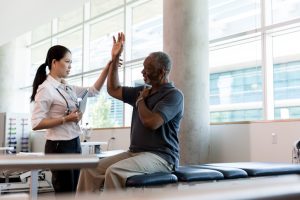Shoulder injuries and pain can be both distressing and debilitating, affecting our ability to perform everyday tasks and enjoy the activities we love. Whether due to a sports-related injury, a work-related strain, or a chronic condition, Twin Boro Physical Therapy provides specialized shoulder rehabilitation to help those in New Jersey recover from shoulder problems and regain their strength, mobility, and quality of life.
What are the Benefits of Shoulder Rehabilitation?
 Shoulder rehabilitation at Twin Boro Physical Therapy offers numerous benefits, including:
Shoulder rehabilitation at Twin Boro Physical Therapy offers numerous benefits, including:
- Pain Relief: Rehabilitation helps reduce or eliminate shoulder pain, allowing you to regain comfort and mobility.
- Improved Range of Motion: Rehabilitation exercises and techniques enhance the range of motion in your shoulder, making it easier to perform daily activities and activities you enjoy.
- Enhanced Muscle Strength and Endurance: Strengthening exercises restore muscle strength and endurance, providing better support for the shoulder joint and reducing the risk of reinjury.
- Faster Recovery: With the guidance of skilled physical therapists, your shoulder can recover more quickly and effectively.
- Prevention of Future Injuries: Shoulder rehabilitation equips you with the knowledge and tools to maintain a healthy shoulder and reduce the risk of future injuries, whether in sports, work, or daily life.
5 At-Home Shoulder Exercises
The shoulder is one of the human body’s most complex and mobile joints. It allows us to perform a wide range of motions, from lifting heavy objects to reaching for the top shelf. However, this incredible flexibility also makes the shoulder vulnerable to various injuries and conditions. Here are five at-home exercises that can aid in shoulder rehabilitation efforts:
Pendulum Exercises:
- Stand or sit with your good arm supporting your body on a table or chair.
- Let your injured arm hang straight down.
- Gently swing your injured arm in small circles, clockwise and then counterclockwise.
- Start with small circles and gradually increase the diameter of the circles as shoulder mobility improves.
Wall Angels:
- Stand with your back against a wall.
- Keep your feet shoulder-width apart and your back, shoulders, and arms in contact with the wall.
- Slowly slide your arms up the wall as high as possible without pain.
- Lower your arms back down.
- Repeat for a set of 10-15 repetitions.
Doorway Stretch:
- Stand in a doorway with one hand on the door frame.
- Gently lean forward, allowing your body to move through the doorway while keeping your hand on the frame.
- You should feel a stretch in your chest and the front of your shoulder.
- Hold the stretch for 20-30 seconds, repeat a few times.
Scapular Squeezes:
- Sit or stand with your arms relaxed at your sides.
- Squeeze your shoulder blades together as if you’re trying to hold a pencil between them.
- Hold the squeeze for a few seconds, repeat for 10-15 reps.
Isometric Shoulder Exercises:
- Isometric exercises involve contracting the muscles without moving the joint.
- For the shoulder, you can perform isometric exercises like pushing your hand into a wall or doorframe.
- Hold the push for 5-10 seconds and repeat for 10-15 reps.
Remember that the key to effective shoulder rehabilitation is gradual progression. If you experience pain during any exercise, stop immediately and consult your physical therapist.
Achieve Should Pain Relief with Twin Boro
Whether you’re an athlete recovering from a sports-related injury or an individual dealing with chronic shoulder pain, the skilled and dedicated physical therapists at Twin Boro Physical Therapy throughout New Jersey are here to help you regain your strength, mobility, and quality of life. Find a location near you to start your shoulder rehabilitation journey today!

